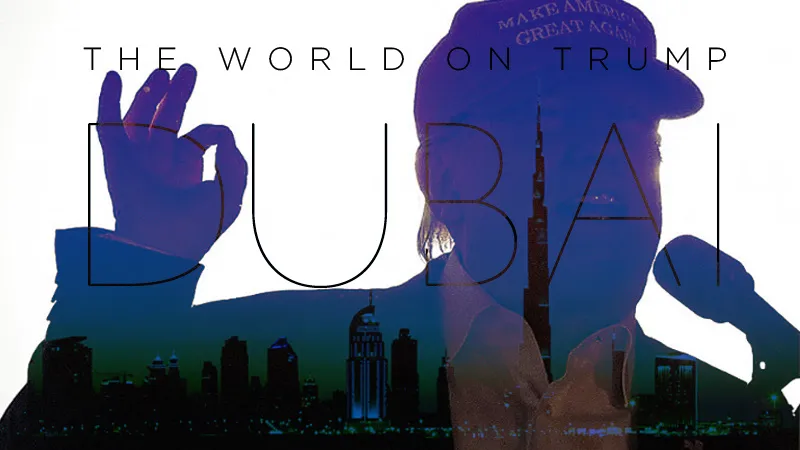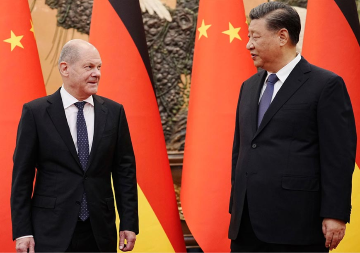
A new series assesses how the world sees Donald Trump's election to the US Presidency, and how such perceptions will affect India's foreign policy. This series will run for a fortnight, filed from West Asia, East Asia and Europe.
Trump’s election may lead Gulf countries to believe globalisation is dead, with severe consequences for India’s economic and regional interests.
Dubai: At the World Economic Forum's annual meeting of "Future Councils" here, lawyers, economists and entrepreneurs have gathered not only to praise, but also bury capitalism. Among global elites, the perception that the liberal, international order is on its last leg is strong, following presidential elections in the United States, and Britain's exit from the European Union. This sentiment is driven by an assumption — perhaps misplaced — that the West will continue to be the fountainhead of international regimes that ease the flow of trade, people and information. For the UAE, and many Gulf countries, the "de-globalisation" impulse throws their carefully planned embrace of the Washington Consensus into disarray.
On Sunday, Gulf News, the Emirates' most prominent English daily, carried an editorial calling on the Trump administration not to "ignore" climate change, or the "ground-breaking" Paris accords. That a Gulf monarchy long reliant on non-renewable sources of energy now feels the need to remind the US of its multilateral — and indeed, moral — commitments reflects the concerns in this part of the world. No region is affected more profoundly and immediately by policies articulated in Washington D.C. than West Asia. President George W. Bush's decision to invade Iraq, and his successor's efforts to pursue rapprochement with Iran have singularly changed the political and security outlook of the region. Therefore, it is with some trepidation that elites here see the election of Donald J. Trump. At the WEF, Cabinet Affairs and Future of the UAE Minister Mohammed Al Gergawi suggested that the UAE will help co-create "global governance frameworks" to manage technological disruptions in industry. The appetite for multilateral engagement in Asia stands in sharp contrast to the purported isolationism that emanates from the West today.
If the UAE and other Gulf Cooperation Council countries like Saudi Arabia have sought to turn the page on their oil economies, Trump’s victory will give pause to its leadership.
The US president-elect's focus on creating and sustaining jobs is shared by monarchs in the Gulf, who will wonder if the transition to "green" technologies and automated industry chains will spur resentment against their regimes. While US foreign policy under Trump would be difficult to predict, his election itself is a signal to West Asian governments to go slow on their modernisation plans. Decisions made by the Organisation of Petroleum Exporting Countries (OPEC) in the coming months will be a barometer of this political sentiment.
Then there is the matter of Trump’s Middle East policy itself. If his campaign statements translate into policy, the United States could well withdraw — even partially — from underwriting the region's security. This possibility may trigger an increase in defence expenditure across the GCC — it could also trigger instability in the absence of an arbiter, however partial, of the Iran-Saudi Arabia contest. Receding US influence may nudge Riyadh to seriously assess the benefits of acquiring a nuclear weapon, which will have dramatic consequences for the region’s balance of power. The Trump presidency may, as a result, renew the lifeline of institutions whose legitimacy suffered in the aftermath of the Arab Spring, but will now be needed to establish regional cooperation. One notable case in point is the Arab League. How the US President will engage Russia remains to be seen but the bilateral relationship will be crucial to regional efforts in countering the Islamic State and other terrorist networks.
Receding US influence may nudge Riyadh to seriously assess the benefits of acquiring a nuclear weapon, which will have dramatic consequences for the region’s balance of power.
West Asia's response to Trump and his foreign policy implicates India’s economic and security interests. Should the major takeaway for Gulf countries from the recently concluded elections be that immigration is a trigger for political upheaval, they may craft policies that limit future economic opportunities for Indians in the region. Indian expatriates mostly contribute to the low and semi-skilled workforce in the Gulf, but this is set to change in response to growing demand for legal, educational and financial services among its wealthy classes. The 'de-globalisation' impulse will be strongly felt in West Asia, whose policy consequences New Delhi should prevent by engaging the region's political leadership. The visit of UAE’s Crown Prince Mohammad Bin Zayed as the chief guest to India’s Republic Day next year is a timely opportunity to review this development.
The UAE in particular is a valuable partner for India in co-creating and adopting green technologies. The Emirates has pushed hard to reduce its reliance on non-renewable energy, and unlike Saudi Arabia, which has only now sought to divest its economic output, the UAE has made significant investments in its high-consumption sectors to lighten its carbon footprint. Faced with US apathy, the Paris climate accord will stumble, as will India's efforts to obtain technology financing. In the aftermath of US elections, India should reach out to Asian powers like the UAE, Japan and Singapore with a view to further its climate financing goals.
Finally, the Trump presidency only underscores the importance of India’s consistent engagement with all West Asian powers. After a prolonged period of isolation, the nuclear deal has allowed Iran to come in from the cold, and US isolationism will further tempt Tehran to assert its regional clout. To the Modi government’s credit, it has ramped up ties with both Iran and Saudi Arabia — if it’s recent actions in Yemen are any indication, Saudi Arabia’s muscular foreign policy will only be encouraged by a weak US role in West Asia. Extreme consequences such as Riyadh’s pursuit of nuclear weapons will also mend recent strains in the Saudi-Pakistan relationship, as the kingdom will seek Islamabad's help to build its weapons program. All signs lead one to believe that the next four years will be marked by the consolidation of power by the region’s heavyweights, bringing them closer to confrontation. India should be well prepared to face this eventuality, given that the deteriorating security situation in Iraq and Syria have not only set back economic opportunities for expatriates but also triggered radicalisation movements in pockets across South Asia.
The views expressed above belong to the author(s). ORF research and analyses now available on Telegram! Click here to access our curated content — blogs, longforms and interviews.




 PREV
PREV


